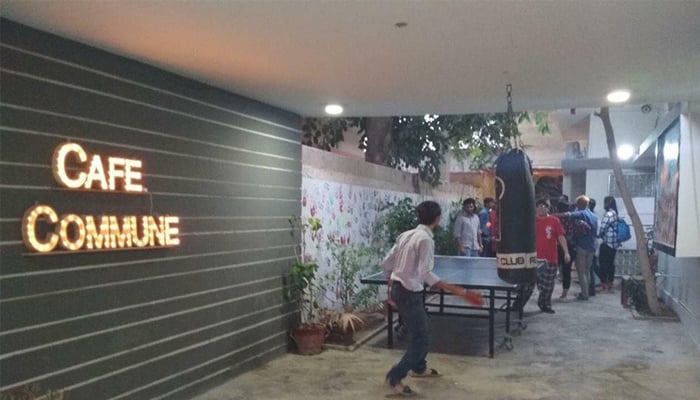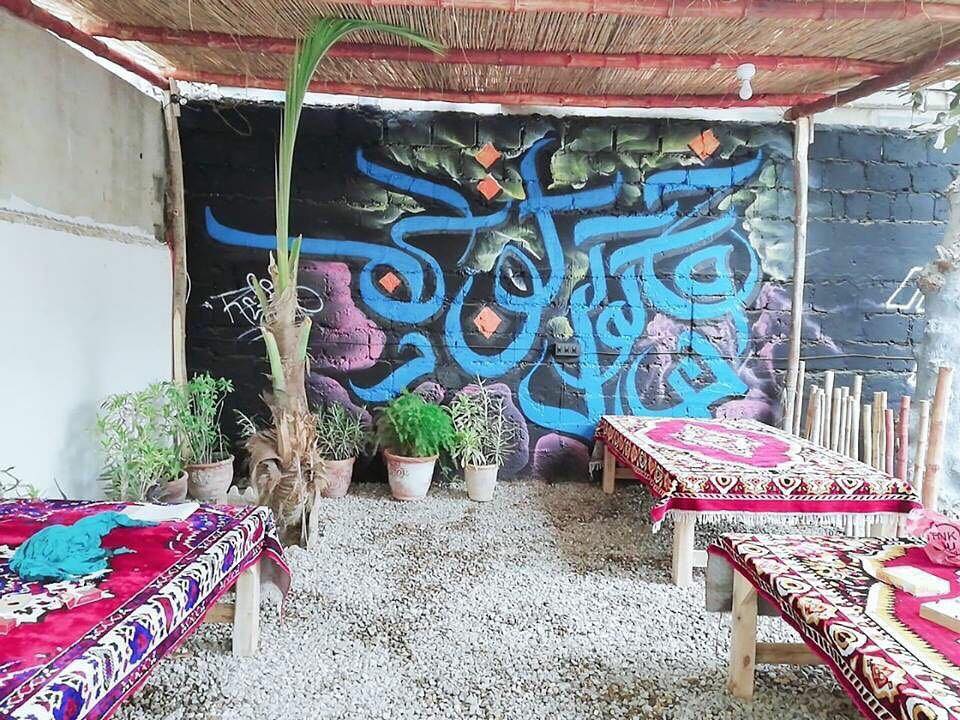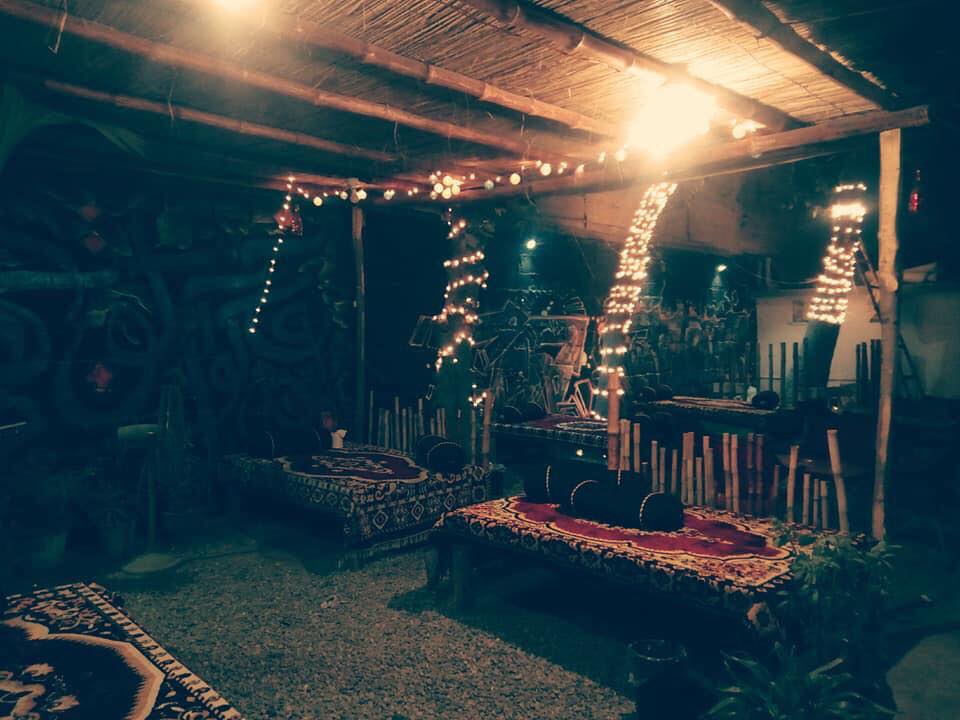Café Commune opens its doors to art and culture enthusiasts
The usually quiet lanes around North Nazimabad’s C-41 in Block J came to life this past weekend as people from all age groups attended the two-day launch of a new space for the residents of District Central by the name of Café Commune.
The usually quiet lanes around North Nazimabad’s C-41 in Block J came to life this past weekend as people from all age groups attended the two-day launch of a new space for the residents of District Central by the name of Café Commune.
The space that is being looked after by a team of progressive thinkers was able to draw a large crowd on the opening day, which was filled with different activities promoting art and culture.
Team leader Saad Rabbani said that a safe space for the locals was badly needed, and that the café is not far for the people residing in Nazimabad, Federal B Area and other adjoining neighbourhoods. The opening event comprised a line-up of different aspiring poets and artistes.
Asad Aly, a communication design student, spoke about his self-published piece ‘Gustakh’ in connection with the agency that the cishet community has in sharing their work with the world without any fear of being judged or ostracised.
Journalist Ali Arqam read out a poem by an Afghan poet who talked of war, but he felt that the poem also spoke to him because of Karachi’s condition a few years ago when fear and instability were always in the air.
Poet Atiya Daud read out her poem ‘Machini Insaan’ in Sindhi that is about the monotony of life and humans acting like robots following a strict routine even in their everyday utterances. Zulfiqar Mannan, who goes by the mononym Zulfi, performed two of his pieces: one was dedicated to Lahore and the other was called ‘Beghairti’, a social commentary on society’s take on gender and sexuality.
His piece identified the hypocrisy of the Pakistani society with regard to how cishet male privilege eclipses other genders and sexualities by stereotypes and shuns their existence by oppressing them.
As a space, Café Commune offers people a place to sit and talk alongside a library as well as a room that can be a space for artists to present their work and a place to hold discussions or screen films.
The team behind the venture also collaborated with artists who have painted the walls of the space. The wall opposite the gallery room shows caricatures of many poets and revolutionaries while the library displays portraits of thinkers who made a difference in the world.
One of the attendees, Shayan Rajani, felt that the space was unlike any other in the city. “Its walls abound with art reflecting the creative energies and progressive politics of the place.” Rajani said its seating is open and casual, encouraging informal interactions. It has multiple spaces for different purposes and an explicitly inclusive all-gender bathroom facility, he added.
“But most important of all, its elements are the people who come to the space. They transform the café into a community space. The opening night saw all kinds of people from activists and artists to teachers and musicians.”
He said the friendliness and openness of the people made him feel at home in Café Commune. “It was like finally arriving at a place where you could be totally at ease. It’s a feeling I shall treasure and which will make me return to the space over and over.”
Muzammal Afzal said that once the project kicks off, he and his team would make sure that the community frequenting the café takes its ownership. “Even though newer spaces are opening up, most of them are inaccessible for people living in other districts because they are catering to a few areas.”
Afzal said that Café Commune would not just be a safe space but would also promote conversations that are often suppressed, and that this space would be open to musicians, artists and political thinkers who want to steer the community towards progress.
“We would also invite people to hold different language classes here as well as to conduct technical courses so the people who can’t travel far can better equip themselves to face life’s challenges.”
Singers Abid Brohi and Arieb Azhar also performed on the first day of the launch, while on the second day documentaries were screened, followed by a drum circle in which people played hand-drums taking the lead from a facilitator.
-
 Nick Jonas Gets Candid About His Type 1 Diabetes Diagnosis
Nick Jonas Gets Candid About His Type 1 Diabetes Diagnosis -
 King Charles Sees Environmental Documentary As Defining Project Of His Reign
King Charles Sees Environmental Documentary As Defining Project Of His Reign -
 James Van Der Beek Asked Fans To Pay Attention To THIS Symptom Before His Death
James Van Der Beek Asked Fans To Pay Attention To THIS Symptom Before His Death -
 Portugal Joins European Wave Of Social Media Bans For Under-16s
Portugal Joins European Wave Of Social Media Bans For Under-16s -
 Margaret Qualley Recalls Early Days Of Acting Career: 'I Was Scared'
Margaret Qualley Recalls Early Days Of Acting Career: 'I Was Scared' -
 Sir Jackie Stewart’s Son Advocates For Dementia Patients
Sir Jackie Stewart’s Son Advocates For Dementia Patients -
 Google Docs Rolls Out Gemini Powered Audio Summaries
Google Docs Rolls Out Gemini Powered Audio Summaries -
 Breaking: 2 Dead Several Injured In South Carolina State University Shooting
Breaking: 2 Dead Several Injured In South Carolina State University Shooting -
 China Debuts World’s First AI-powered Earth Observation Satellite For Smart Cities
China Debuts World’s First AI-powered Earth Observation Satellite For Smart Cities -
 Royal Family Desperate To Push Andrew As Far Away As Possible: Expert
Royal Family Desperate To Push Andrew As Far Away As Possible: Expert -
 Cruz Beckham Releases New Romantic Track 'For Your Love'
Cruz Beckham Releases New Romantic Track 'For Your Love' -
 5 Celebrities You Didn't Know Have Experienced Depression
5 Celebrities You Didn't Know Have Experienced Depression -
 Trump Considers Scaling Back Trade Levies On Steel, Aluminium In Response To Rising Costs
Trump Considers Scaling Back Trade Levies On Steel, Aluminium In Response To Rising Costs -
 Claude AI Shutdown Simulation Sparks Fresh AI Safety Concerns
Claude AI Shutdown Simulation Sparks Fresh AI Safety Concerns -
 King Charles Vows Not To Let Andrew Scandal Overshadow His Special Project
King Charles Vows Not To Let Andrew Scandal Overshadow His Special Project -
 Spotify Says Its Best Engineers No Longer Write Code As AI Takes Over
Spotify Says Its Best Engineers No Longer Write Code As AI Takes Over






